Five Beautiful Arch Linux Distributions

Arch Linux offers a rolling update model, the powerful pacman package manager, and thousands of applications available through its software repositories. Custom Linux distributions are very popular because they provide a DIY approach. One of its advantages is the various community-driven distributions that offer pre-configured settings and visually pleasing interfaces.
This article will introduce some of them. The main focus of these distributions is their appearance design.
Beautiful Arch Linux Distros
Let’s explore some of the top beautiful Arch Linux distributions that combine aesthetics with the core functionality of Arch Linux:
XeroLinux
XeroLinux offers a visually stunning interface and smooth design. The KDE Plasma desktop environment comes pre-installed, providing a clean and tidy workspace. This distro is based on Arch Linux and is aimed at users who prefer a desktop environment with the latest packages and visual effects of KDE Plasma, but don't want to reconfigure their Plasma desktop environment. XeroLinux primarily uses preconfigured Latte Dock and Kvantum to bring a unique look to the desktop environment.
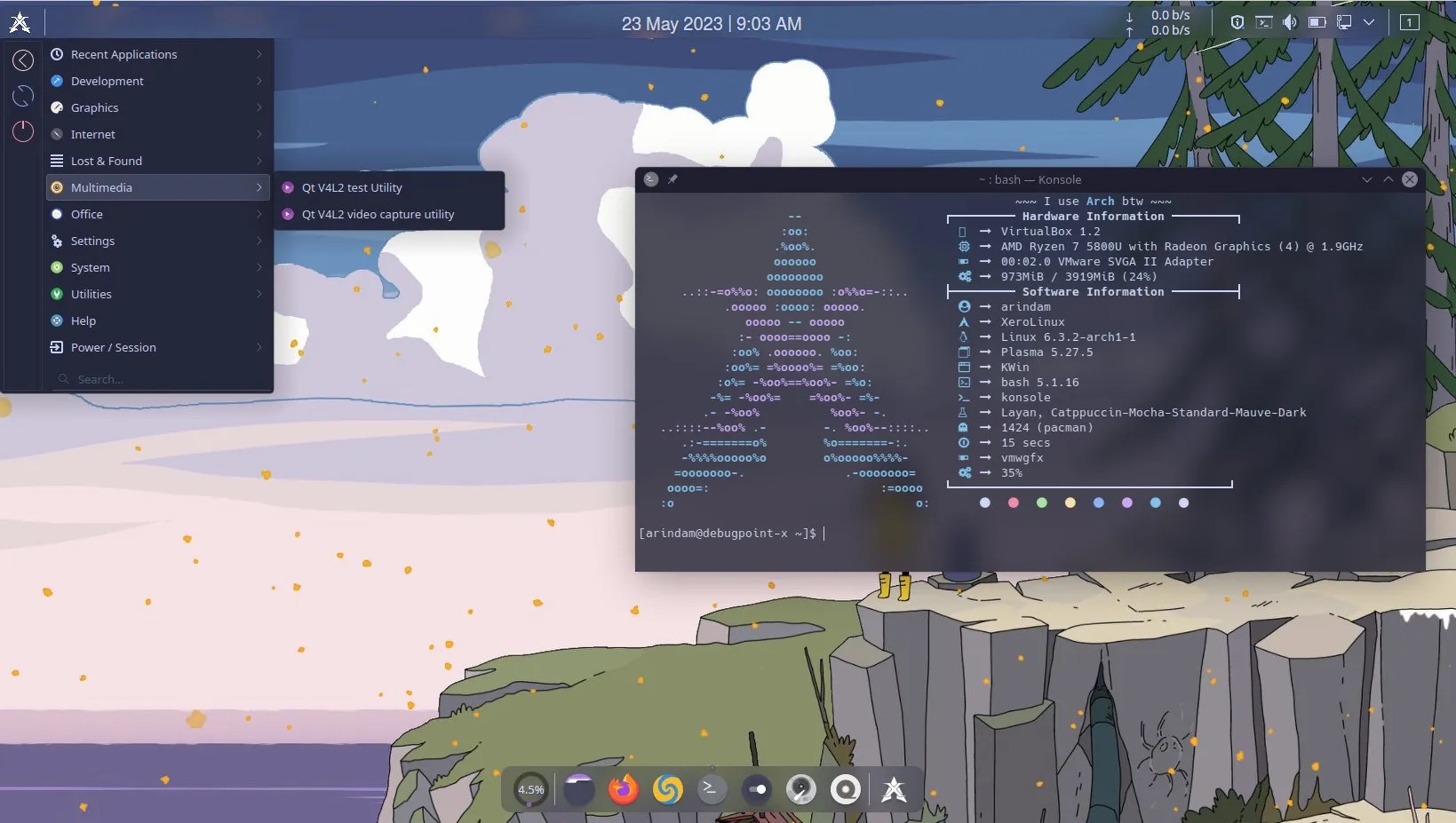
XeroLinux Desktop
By default, it uses the Catppuccin theme, which is an open source theme, Designed to be a middle ground between high-contrast and low-contrast subjects. The Catppuccin theme offers four soothing warm color palettes for the KDE Plasma desktop environment, suitable for a variety of uses, such as coding, casual browsing, or studying.
The Plasma desktop environment is configured with the following default components:
- Application style: Lightly
- Plasma style: Scratchy
- Icon: Tela circle drakula dark
- Cursor: Catppuccin mocha dark
- Window decoration: Lightly
In addition to the above, KDE Plasma top bar application global menu and terminal transparency are provided A plug-and-play visual sublimation.
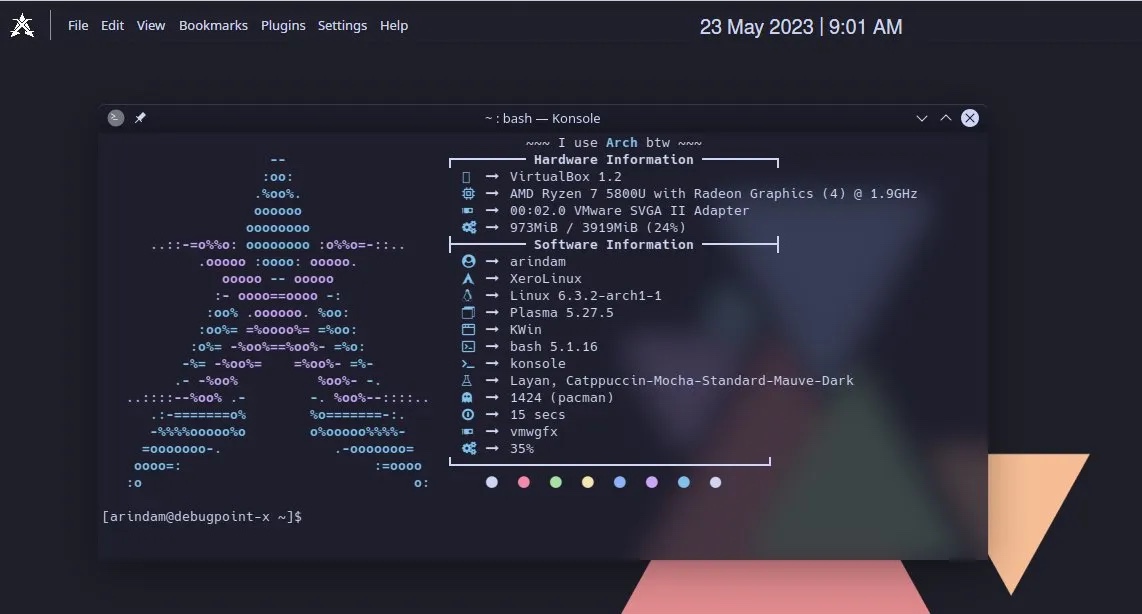
Transparent Terminal and Global Menu
Learn more about XeroLinux performance, applications, and other aspects by reading My feature review. XeroLinux can be downloaded using the link below.
Mabox Linux
If you are a fan of window managers and want For an amazing Arch Linux distribution, try Mabox Linux. Mabox Linux focuses on simplicity and elegance. This is a variant of Manjaro Linux whose primary desktop environment uses the Openbox window manager. Openbox leverages its intuitive interface and visually pleasing themes to bring users a smooth and immersive computing experience.
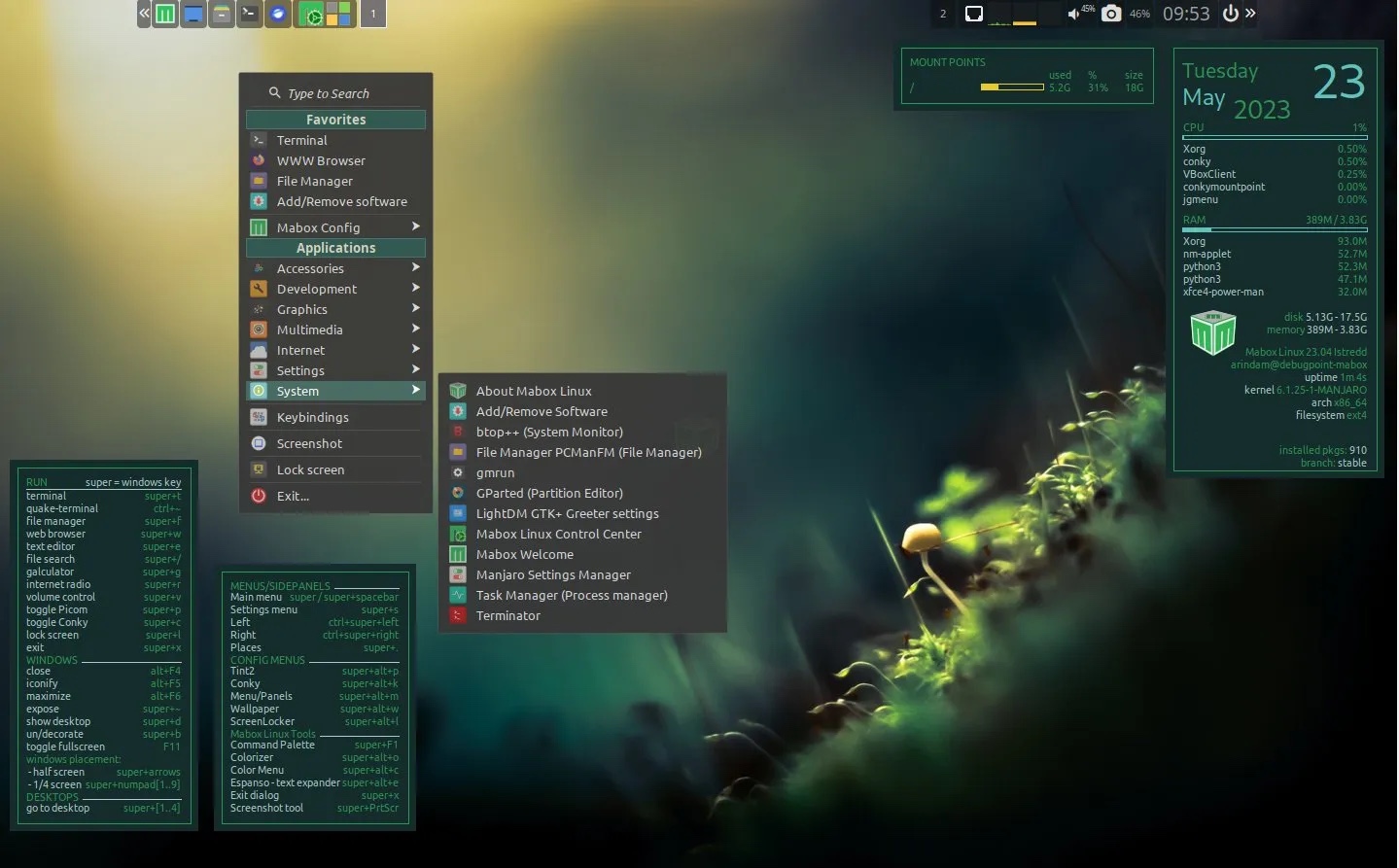
Mabox Linux
The default appearance includes a tint2 panel at the top, which has two parts. Some Conky projects provide much needed information on the desktop. The right-click menu gives you access to all applications and settings on your desktop.
For further customization, Mabox provides its own control center, allowing you to customize OpenBox, Conky, panels and everything in one place.
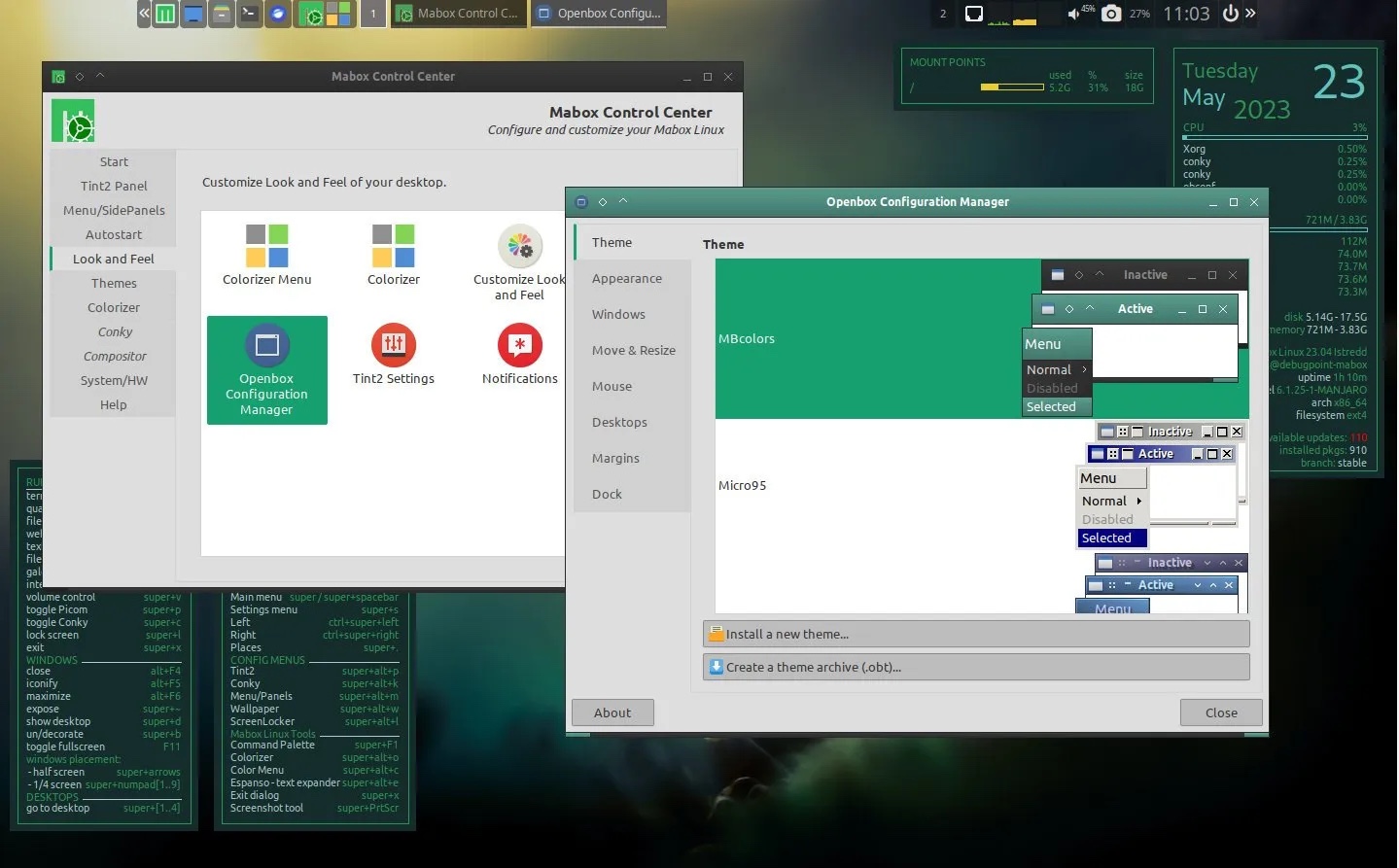
OpenBox configuration using Mabox Control Center
User-friendly installation process, screened software, for those who want to use For window manager people, Mabox Linux is an excellent choice.
You can learn more about Mabox Linux in my review article. You can download it using the following page.
Crystal Linux
The recently launched Crystal Linux is the next distribution on this list. Crystal Linux defaults to the custom GNOME desktop "Onyx" and provides options for GNOME, KDE Plasma, Xfce and i3 window managers.
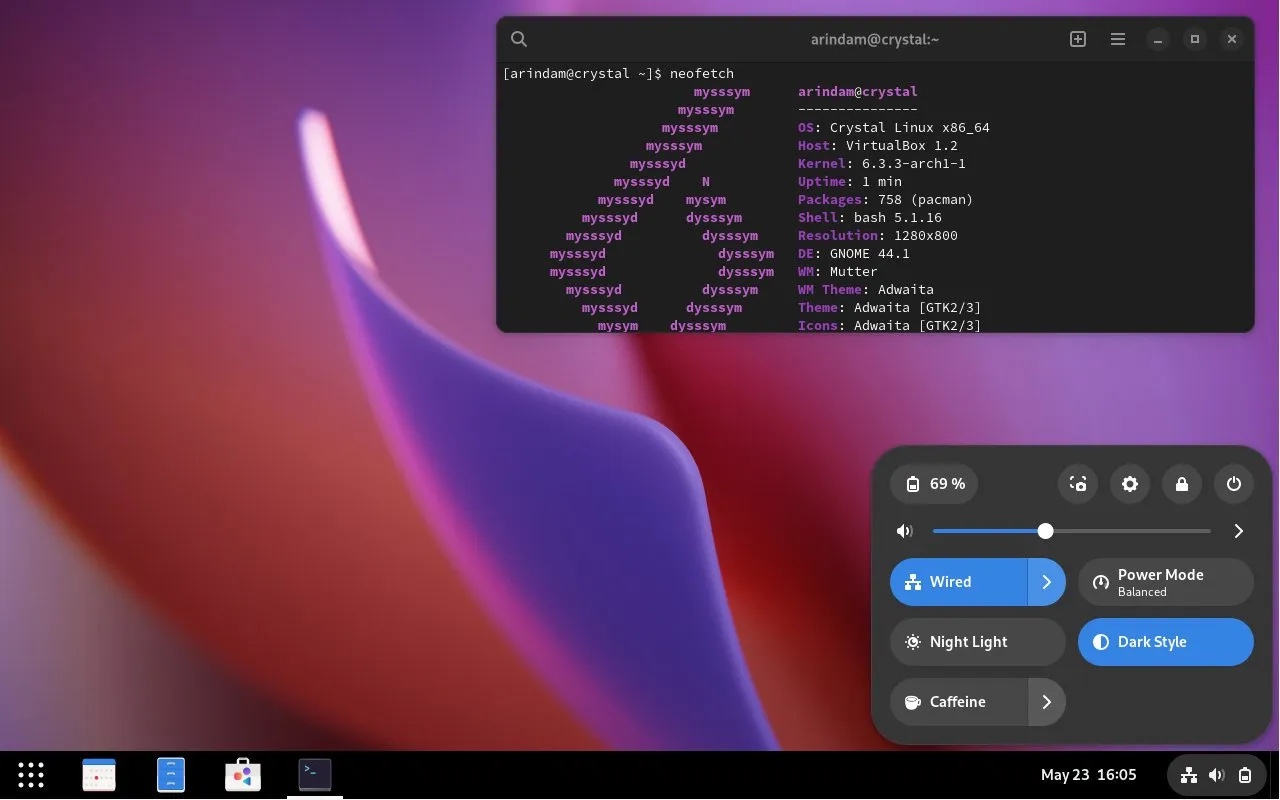
Crystal Linux Desktop
The main reason I included it on this list is that it is cleanly built for Arch Linux One of the unique distributions with GNOME look. In terms of customization, you get the basic Adwaita GNOME theme, beautiful wallpapers, fixed bottom dock, and GNOME quick settings.
However, the clean GNOME desktop is truly beautiful, and you can customize it even further. Crystal Linux also has other benefits, such as the Amethyst AUR helper, the pacman package manager wrapper, Wayland support, and many other benefits.
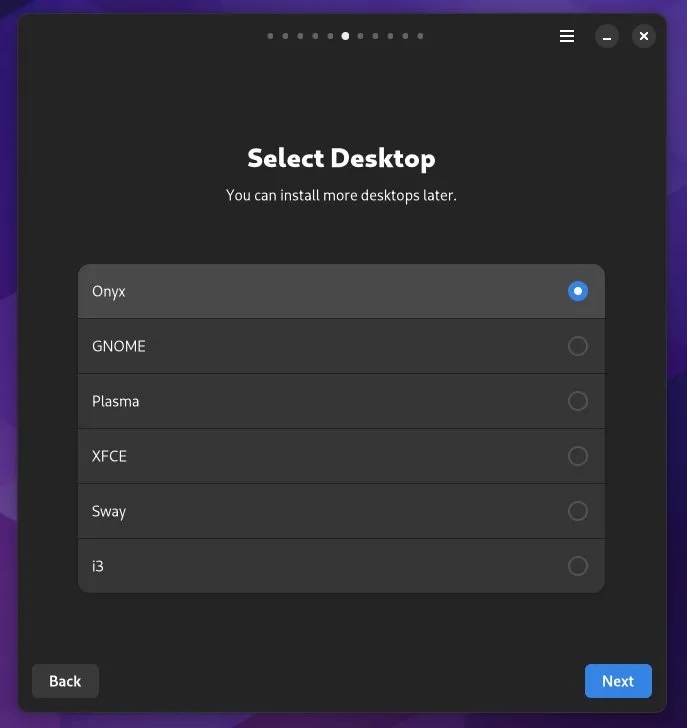
Select your desktop environment when installing Crystal Linux
You can download Crystal Linux from the following page.
Archcraft OS
Archcraft OS is another beautiful Openbox based and bspwm window managers for Arch Linux. Its goal is to create a stunning-looking "pure" Arch Linux experience.
Archcraft OS has a beautiful and attractive user interface, built-in Openbox themes and attractive wallpapers. The software provides a pre-installed settings manager to facilitate users to configure Openbox. The default window manager theme, coupled with wallpapers, creates an engaging visual experience.
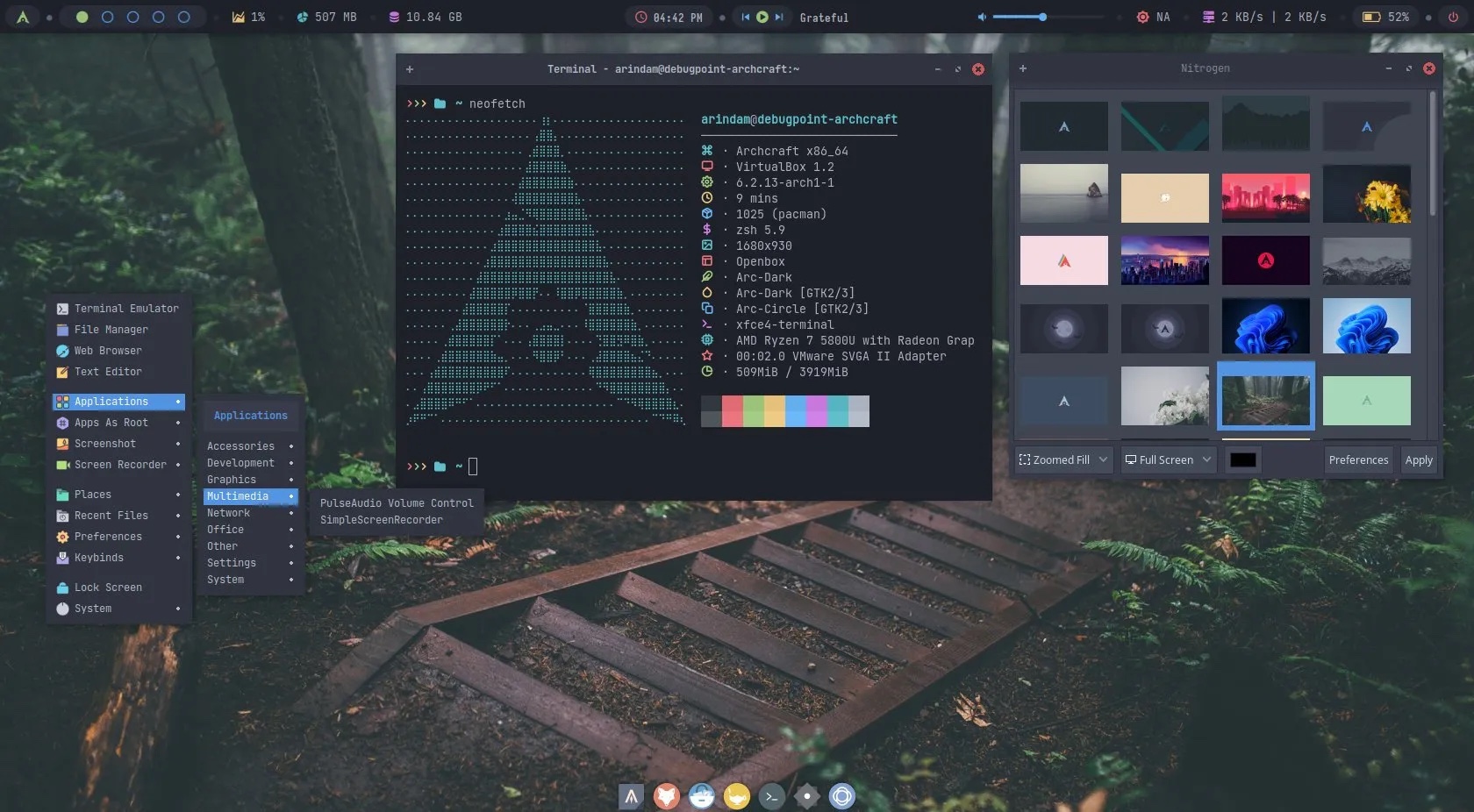
Archcraft OS
The default panel of Archcraft OS includes workspace list, clock and date display, volume control, power options, Essential components such as CPU, memory, and disk usage indicators. The panels maintain a clean and visually pleasing appearance.
Archcraft OS comes with a variety of pre-installed Openbox themes and styles, offering two combinations of light and dark options.. These styles include Beach, Forest, Grid, Manhattan, Slime, Spark, and Wave.
It is one of the beautiful pre-configured Arch Linux distributions. You can download it from the following page.
Exodia OS
Exodia OS is a software specifically designed for network security An Arch Linux distribution built for professionals, even if you're not deeply involved in the world of cybersecurity, you'll appreciate Exodia OS's visually pleasing interface and user-friendly tools.
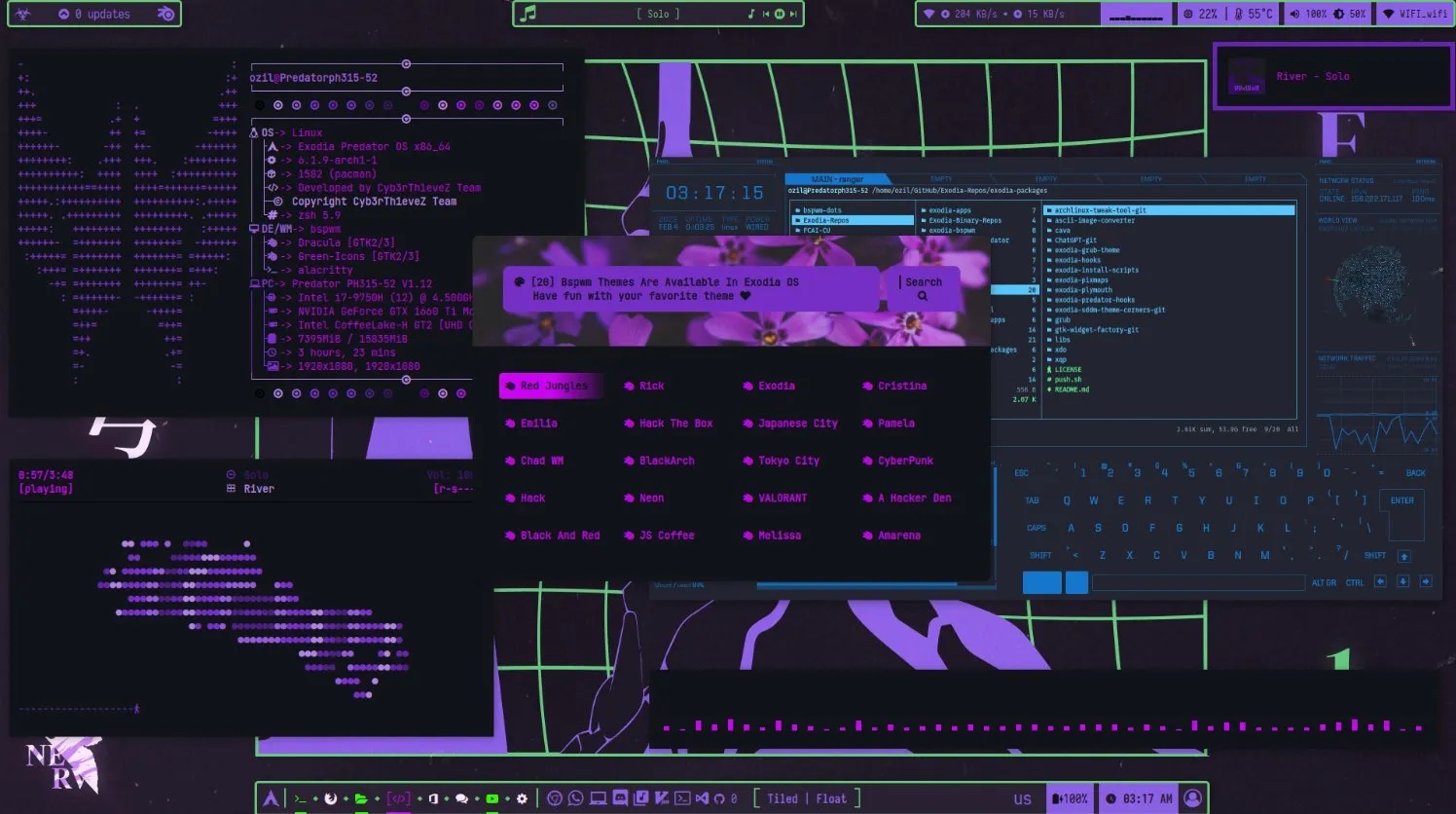
Exodia OS
Exodia OS comes with BSPWM, a tiling window manager and provides 20 Customize themes to enhance the visual experience.
Here are some of the key benefits of Exodia OS:
- It comes with pre-installed network security tools that cover all aspects of network security.
- There are currently three versions available: Home, Predator and Wireless.
- Currently supports two window managers, BSPWM and DWM, and plans to support more desktop environments and window managers in the future.
You can download Exodia OS from the following page.
Summary
In conclusion, the top-notch beautiful Arch listed above The Linux distribution combines the power of Arch Linux with a visually pleasing interface to provide users with a personalized and aesthetic experience. The distributions listed in this article cover a variety of popular desktop environments and window managers.
These distributions provide customizability, stability, and lightweight performance. Hopefully you can find an Arch Linux distribution that wows you and suits your personal tastes.
The above is the detailed content of Five Beautiful Arch Linux Distributions. For more information, please follow other related articles on the PHP Chinese website!

Hot AI Tools

Undresser.AI Undress
AI-powered app for creating realistic nude photos

AI Clothes Remover
Online AI tool for removing clothes from photos.

Undress AI Tool
Undress images for free

Clothoff.io
AI clothes remover

AI Hentai Generator
Generate AI Hentai for free.

Hot Article

Hot Tools

Notepad++7.3.1
Easy-to-use and free code editor

SublimeText3 Chinese version
Chinese version, very easy to use

Zend Studio 13.0.1
Powerful PHP integrated development environment

Dreamweaver CS6
Visual web development tools

SublimeText3 Mac version
God-level code editing software (SublimeText3)

Hot Topics
 1378
1378
 52
52
 Five reasons why you should update your Linux kernel
Jun 10, 2023 am 11:02 AM
Five reasons why you should update your Linux kernel
Jun 10, 2023 am 11:02 AM
The Linux kernel is the most important part of the distribution, controlling everything from resource allocation to RGB keyboard drivers. Regular updates to the Linux kernel continue to roll out, bringing bug fixes, support for advanced features, and a host of other enhancements. While no one is forcing you to update to the latest Linux kernel, here are five good reasons why you should. What exactly is the Linux kernel? People often say that Linux is not actually an operating system, and it's true. Most distributions are really just a set of software and package managers that allow you to interact with the underlying kernel. A short explanation of how the Linux kernel works is that the kernel is responsible for managing system resources, interacting with hardware and external devices, networking and files
 Best lightweight Linux distributions for low-end or older computers
Mar 06, 2024 am 09:49 AM
Best lightweight Linux distributions for low-end or older computers
Mar 06, 2024 am 09:49 AM
Looking for the perfect Linux distribution to breathe new life into your old or low-end computer? If yes, then you have come to the right place. In this article, we'll explore some of our top picks for lightweight Linux distributions that are specifically tailored for older or less powerful hardware. Whether the motivation behind this is to revive an aging device or simply maximize performance on a budget, these lightweight options are sure to fit the bill. Why choose a lightweight Linux distribution? There are several advantages to choosing a lightweight Linux distribution, the first of which is getting the best performance on the least system resources, which makes them ideal for older hardware with limited processing power, RAM, and storage space. Beyond that, with heavier resource intensive
 Better than Ubuntu? 11 Best Linux Distros for Ubuntu Lovers
Jul 02, 2023 pm 05:02 PM
Better than Ubuntu? 11 Best Linux Distros for Ubuntu Lovers
Jul 02, 2023 pm 05:02 PM
If you are looking for the perfect distro for your system, chances are very high that you will choose an Ubuntu-based distro. You may ask why. Well, it’s no surprise that Ubuntu is one of the best Linux distributions for beginners. It is also very popular, which is why you will find that it has a huge user community. Not only that, it is also widely used on cloud servers. So using Ubuntu as the basis of your Linux distribution should bring some useful advantages, right? That’s why I’ve put together a list of the best Ubuntu-based distros, in the hope that you’ll find one that’s good enough to make you stop switching distros so often. 1. Ubuntu official derivative version budgiedesktops
 Debian version numbers, codenames and software sources
Feb 20, 2024 am 09:01 AM
Debian version numbers, codenames and software sources
Feb 20, 2024 am 09:01 AM
Debian is one of the largest distributions of Linux systems, but its version naming has always troubled me. Therefore, I sorted out the naming and relationships of various Debian versions. Version number (number) Debian version number is directly represented by numbers, such as Debian8, 9, 10, 11 and so on. Starting with Debian 6, every major distribution will add 1 to the original number. For example, Debian12 will be released in 2023. Based on the current version, small updates are represented by increasing decimals. For example, after Debian 12.0 is released, the subsequent updated versions are 12.1, 12.2, etc. The version number is relatively conventional and in line with general knowledge. Version code (nickname) In addition to the version number,
 How to Download and Install Linux for Windows 11
Oct 19, 2023 pm 11:13 PM
How to Download and Install Linux for Windows 11
Oct 19, 2023 pm 11:13 PM
Linux is an operating system, similar to Windows, but with many different versions due to its open source and fully customizable nature. To install Linux, you must choose an installation method and select a Linux distribution. To install Linux: Choose an installation method: Windows Subsystem for Linux (WSL), bare metal Linux; or create a virtual machine (VM) to run Linux locally or in the cloud. Choose a Linux distribution: Ubuntu, Debian, KaliLinux, OpenSUSE, etc. Follow the steps for your preferred installation method: Use the installLinux command with WindowsSubsys
 What are some ways to disable the graphical interface of a CentOS distribution?
Jan 03, 2024 am 09:18 AM
What are some ways to disable the graphical interface of a CentOS distribution?
Jan 03, 2024 am 09:18 AM
Many friends who use Linux at home use virtual machines to build Linux. The resources that can be allocated to virtual machines are limited. If some services are not turned off, the system will become stuck. Among these services, the graphical interface is the first service to be shut down. Below I list the methods for turning off the graphical interface in three distributions that I have used. 1.CentOS5, 6 series. Open the /etc/inittab file and change the line id:5:initdefault to id:3:initdefault:. Restart the system to take effect. If you want to take effect immediately, you can enter "init3" on the command line; 2. CentOS7 series. ln-svf/li
 Five Beautiful Arch Linux Distributions
Jun 09, 2023 am 12:31 AM
Five Beautiful Arch Linux Distributions
Jun 09, 2023 am 12:31 AM
ArchLinux offers a rolling update model, the powerful pacman package manager, and thousands of applications available through its software repositories. It is very popular because it allows you to create customized Linux distributions in a DIY manner. One of its strengths is the variety of community-driven distributions that offer preconfigured settings and visually pleasing interfaces. This article will introduce some of them, the main focus of these distributions is their appearance design. Beautiful ArchLinux Distros Let’s explore some of the top beautiful ArchLinux distributions that combine aesthetics with the core functionality of ArchLinux: XeroLinuxXeroLinux provides a visual
 Six great Linux distributions for network engineers
Jul 18, 2023 pm 09:46 PM
Six great Linux distributions for network engineers
Jul 18, 2023 pm 09:46 PM
As a network engineer, you are not alone when considering installing Linux for your job, as Linux is a common operating system of choice for them. If you are a network engineer, you may be wondering which distributions have the best features at work. The following are the 6 best Linux distributions for network engineers: 1. Fedora Among the many Linux distributions, Fedora is one of the most respected among network engineers, and the reason is simple. Fedora is an open source distribution equivalent to the community edition of Red Hat Enterprise Linux (RHEL). RHEL itself is often chosen as the operating system for enterprise-level systems. As a result, network engineers using Fedora will become more familiar with the RHE they encounter throughout their careers.




